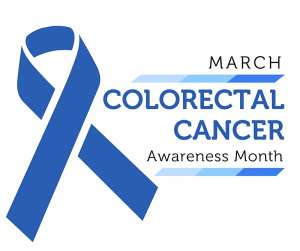
March is designated as Colon and Rectum cancer awareness month. Worldwide there are 1.93 million new CRC cases diagnosed, and 940,000 CRC caused deaths in 2020, representing 10% of the global cancer incidence. It is the third most common cancer worldwide. Two thirds of CRC occur in developed countries, because of longer life expectancy, however, the numbers are declining as screening, education, and treatments are offered and 5-year survival rate is 65% for all stages. In developing countries, however, there is increase in new cases because of adoption of unhealthy habits like eating western diets, increase in fatty foods, not exercising like in walking and Obesity. The median survival in developing countries e.g., in Ghana it is 15 months, and 5-year survival rate is 16%.
Symptoms
Symptoms or warning signs include change in bowel movements e.g. diarrhea or constipation, and shape of stool, recurrent abdominal pain, and bleeding from the rectum. Weight loss, tiredness or fatigue may also be present.
Risk Factors
- Age: mostly those above 50 years
- History of bowel diseases called Crohn's and Ulcerative Colitis
- Personal history of Colon Cancer or certain Colon growths called polyps
- Family history of Colon Cancer or hereditary colon cancer conditions
- Personal history of radiation to the belly or pelvic area
- Overweight and Obesity
- Diet low in fruits and veggies
- High fat, low fiber and diets high in processed meats
- Alcohol and Tobacco abuse
- Lack of regular physical activity
PREVENTION OF COLORECTAL CANCER
Lifestyle changes like exercise, weight loss, high fiber foods, and low-fat diet
Screening starting at age 45 years for those at average risk according to experts. Those with increased risk start earlier, e.g. if you have a parent with colon cancer
- Screening for CRC saves lives and there has been a decrease in incidence and death due to screening.
- There are six screening tests available. Three are Stool based and three are Visual.
- Guaiac Fecal occult blood test- detects blood in stool. Done yearly
- Fecal Immunochemical Test (FIT)- Detects human hemoglobin in stool. Done yearly
- Stool DNA –looks for abnormal DNA and blood in stool. Done every 3 years e.g. Cologuard
- Virtual Colonoscopy- 2 & 3 D images of colon viewed on a computer- Done every 5 years
- Flexible sigmoidoscopy – Lighted tube checks rectum and lower third of colon, and polyps can be removed. Done every 5 years
- Screening Colonoscopy- Lighted tube with camera looks inside the entire colon and polyps can be removed. Every 10 years
What test is done depends on many factors. You can discuss with your doctor. If any of the tests detect a problem, a follow up colonoscopy is usually performed.
Colon cancer if detected early is treatable. Treatment can be in the form of surgery, chemotherapy and or radiation depending on size, location and spread of the cancer.
Share this with others if you have found this helpful.
Dr. Barbara Entsuah (Family Physician, Author, Speaker, Philanthropist)
#Loveyourbody ❤️❤️❤️
www.Barbaraentsuah.com




 There’s nothing you can do for us; just give us electricity to save our collapsi...
There’s nothing you can do for us; just give us electricity to save our collapsi...
 Ghanaian media failing in watchdog duties — Sulemana Braimah
Ghanaian media failing in watchdog duties — Sulemana Braimah
 On any scale, Mahama can't match Bawumia — NPP Youth Organiser
On any scale, Mahama can't match Bawumia — NPP Youth Organiser
 Never tag me as an NPP pastor; I'm 'pained' the 'Akyem Mafia' are still in charg...
Never tag me as an NPP pastor; I'm 'pained' the 'Akyem Mafia' are still in charg...
 Your refusal to dedicate a project to Atta Mills means you never loved him — Kok...
Your refusal to dedicate a project to Atta Mills means you never loved him — Kok...
 2024 elections: I'm competent, not just a dreamer; vote for me — Alan
2024 elections: I'm competent, not just a dreamer; vote for me — Alan
 2024 elections: Forget NPP, NDC; I've the Holy Spirit backing me and nothing wil...
2024 elections: Forget NPP, NDC; I've the Holy Spirit backing me and nothing wil...
 2024 elections: We've no trust in judiciary; we'll ensure ballots are well secur...
2024 elections: We've no trust in judiciary; we'll ensure ballots are well secur...
 Performance tracker: Fire MCEs, DCEs who document Mahama's projects; they're not...
Performance tracker: Fire MCEs, DCEs who document Mahama's projects; they're not...
 Train crash: Railway ministry shares footage of incident
Train crash: Railway ministry shares footage of incident
